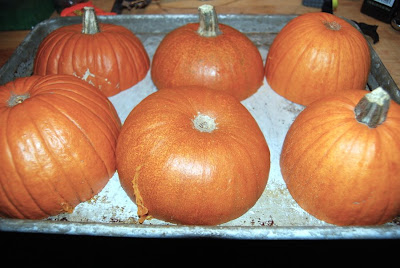 This is how we roast pumpkin to make pumpkin puree for pies and soups. Under each half is a tablespoon of salted butter. This variety is small sugar pumpkin. I like it for processing this way the best of all the pumpkins recommended for pies and soups mostly because I can do three at a time, the vine produces quite a few and they ripen before the vine gets mildew or attacked by stink bugs. They store well too. All around a great pumpkin.
This is how we roast pumpkin to make pumpkin puree for pies and soups. Under each half is a tablespoon of salted butter. This variety is small sugar pumpkin. I like it for processing this way the best of all the pumpkins recommended for pies and soups mostly because I can do three at a time, the vine produces quite a few and they ripen before the vine gets mildew or attacked by stink bugs. They store well too. All around a great pumpkin.I remove from the oven (set at 350-400 degrees F) after about an hour or when I start to see the skin split.
I let cool until I can easily touch them without being burned. Then the skins will have started to curl off, and they easily peel off by pulling with my finger or prodded with a butter knife. I turn them over and scrape the seeds out of the center, but I leave the stringy part mostly. It all goes into the food processor and gets pureed, why waste it?
After whirring a bit in the processor (a blender works too), I scoop into freezer bags or jars in about 2 cup (16 oz) amounts. That's what most recipes call for. From there I can make mashed pumpkin (like mashed potatoes with more nutrients, pumpkin soup, pumpkin bread, or pie filling.
For pie filling I actually cook the pumpkin goo for a little bit on the stove top with butter and cream and seasonings (I like cinnamon and nutmeg), puree it again to get the texture just right and then use whatever recipe calls for a "can of pumpkin" but this way it's free of preservatives and can stuff.
See? Pumpkin IS food and not just porch decoration. ;)

Love the ease of this 'preserving'. No pressure cookers or cans!
ReplyDeleteVery encouraging! Our pumpkins dind't make it to the finish line this year. Your post encourages me to try again next year.
ReplyDeleteHeart smiles,
Pam
Love, love, love your sharing!
ReplyDeleteLove, love, love your sharing!
ReplyDelete